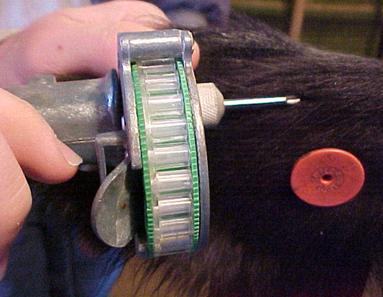
Agricultural News
Implanting 'the Single Most Profitable Management Practice That Stocker Producers Can Use'
Wed, 01 Aug 2012 13:36:42 CDT

Several years ago, the Noble Foundation conducted a study to evaluate various implants for use in stockers grazing wheat and rye pastures. Implants are comprised of hormones compressed into pellets that are placed under the skin of the animal's ear to stimulate additional weight gain and efficiency. Implants are highly effective, generally producing a 5 to 15 percent improvement in average daily gain (ADG). Implants improve the efficiency of beef production, increasing profit for producers and decreasing costs for consumers.
Consultants at the Noble Foundation were interested in knowing which implant program was most effective for stockers. We compared five treatments described in Table 1, which is available by clicking here. In 2001, 2002 and 2003, 125 heifer calves weighing approximately 425 pounds each were grazed on rye pasture from December to late April.
Average daily gain of the stocker heifers is shown in Figure 1, which you will find by clicking here. Two key take-home messages can be gleaned from this figure. First, all the heifers that were implanted gained faster than the non-implanted controls by 12 percent (0.23 pound per day). It is imperative that stocker operators implant their stocker calves. Implanting is likely the single most profitable management practice that stocker producers can use. At 2012 market prices, this additional gain would be worth in excess of $30 per animal. Second, it is important to have an active implant in the cattle from day one. The calves in which we delayed implanting did not fully compensate in the latter half of the grazing season. Reimplanting stockers grazing wheat and rye pastures was not beneficial.
WebReadyTM Powered by WireReady® NSI
Top Agricultural News
More Headlines...



















